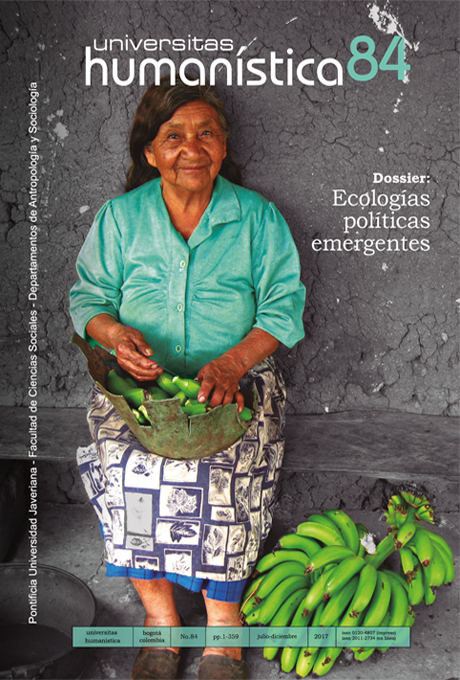Resumo
Esta comunicação explora a aplicação da teoria de ator-rede (TAR) no estudo dos movimentos sociais que emergem em conflitos socioambientais. A partir do caso do Comitê pela Defesa d’Água e o Páramo de Santurbán, discutimos como este tipo de abordagem permite rastrejar a configuração do movimento social como rede heterogênea de agregados materiais e culturais, de elementos humanos e não-humanos que se auto-organizam e podem se unir a outras redes para conseguir suas demandas. Concluímos que o ator-rede “Comitê pela Defesa d’Água e o Páramo de Santurbán” encastra-se a partir de três processos: conhecer, informar e ancorar. Sua agência, sustentada na capacidade do comitê de se constituir em porta-voz da agua, faz uso da rede jurídica, as mobilizações e a produção de conhecimento, para transportá-la e fornecê-la de caraterísticas científicas e políticas até a tornar uma questão de interesse social.

A revista Universitas Humanística encontra-se registada sob a licencia Creative Commons Versão 4.0 Internacional. Portanto, esta obra pode se reproduzir, distribuir e comunicar publicamente em formato digital, sempre que dado o crédito apropriado para os autores e a Pontificia Universidad Javeriana. Permite-se citar, adaptar, remixar, transformar, autoarquivar, republicar e criar a partir do material, para qualquer fim, mesmo que comercial, sempre que indicado apropriadamente o nome do criador, provido um link para a obra original e indicado se mudanças foram feitas. A Pontificia Universidad Javeriana não retém os direitos sobre as obras publicadas e os conteúdos são responsabilidade exclusiva dos autores, os quais conservam seus direitos morais, intelectuais, de privacidade e publicidade.
O aval sobre a intervenção da obra (revisão, correção, edição, tradução, formatação) e a subsequente difusão disponibiliza-se através de licença de uso e não através de transmissão de direitos, o que representa que a revista e a Pontificia Universidad Javeriana são isentas de qualquer responsabilidade que puder se derivar de uma prática ética pobre por parte dos autores. Em consequência da proteção fornecida pela licença de uso, a revista não fica na obrigação de publicar retratações ou alterar informações já publicadas, a não ser que a errata seja decorrente do processo de gestão editorial. A publicação de conteúdos nesta revista não representa royalties para os contribuintes.


